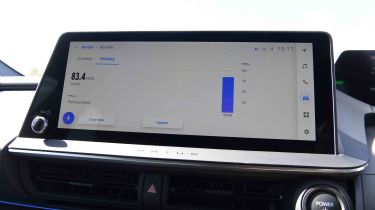Toyota Prius - MPG, emissions & running costs
Residual values are among the best in class, even if range and charging speed aren’t for all versions

The Toyota Prius Plug-in’s economy stats are impressive. Even so, you’re unlikely to get close to the headline 564.9mpg, but you should still manage to achieve better fuel economy figures than you could in a traditional petrol or diesel car – we saw more than 80mpg even when the car’s battery was depleted.
That’s better than any other PHEV we’ve tried with a flat power pack, and demonstrates Toyota’s know-how when it comes to producing an efficient hybrid powertrain. Charge every day and use electricity for your commute, and you should see a higher figure. There’s even a ‘Predictive Efficient Drive’ system that learns your route to work and optimises the powertrain for the best fuel economy.
A regenerative braking system helps to put electricity back into the battery when you’re away from a plug socket and comprises three modes – gentle, medium and strong. It doesn’t quite allow for one-pedal driving, up to 80 per cent deceleration is served up in the ‘strong’ mode.
| Model | MPG | CO2 | Insurance group |
| Prius Plug-in Design | 565.0mpg | 12g/km | 31 |
| Prius Plug-in Excel | 403.5mpg | 17g/km | 31 |
Electric range, battery life and charge time
Despite a small battery of only 13.6kWh capacity, impressive aerodynamic efficiency allows for a fairly good electric range of over 50 miles. If you need a PHEV with even greater electric range, then you’ll need to look at the Skoda Superb iV or Volkswagen Passat, because they both have a larger 25.7kWh (19.7kWh useable) battery pack with enough charge for over 70 miles of EV range.
Used - available now

2020 Toyota
Prius
34,796 milesAutomaticPetrol1.8L
Cash £16,100
2020 Toyota
Prius
50,351 milesAutomaticPetrol1.8L
Cash £17,800
2020 Toyota
Prius
44,951 milesAutomaticPetrol1.8L
Cash £19,911
2018 Toyota
Prius
52,000 milesAutomaticPetrol1.8L
Cash £12,500It takes about four hours to top up the battery on a home charger, because the on-board 3.5kW charger isn’t fast – but for overnight plug-ins, that doesn’t matter a huge amount.
| Model | Battery size | Range | Insurance group |
| Toyota Prius PHEV Design | 13.6kWh | 53.4 miles | 31 |
Tax
Company car tax bills are inexpensive, thanks to low CO2 emissions of 17g/km and plug-in hybrid status. Standard-rate taxpayers will fork out £638 to tax the Prius as a company car in the 2024/25 tax year – a couple of hundred pounds more than a similarly priced EV, but less than equivalent petrol models – while VED is £180 with both versions skirting under the £40,000 mark to avoid the expensive-car supplement.
Insurance
The insurance group of 31 is quite high, likely because previous versions are frequently used in cities and suffer low-speed accidents often. There’s also the cost of repair for the powertrain to consider.
Depreciation
Our experts predict that the Prius will retain around 54 per cent of its value after three years, which is good news for private buyers; the average car tends to be closer to the 45-50 per cent mark.
To get an accurate valuation for a specific model, check out our valuation tool..








